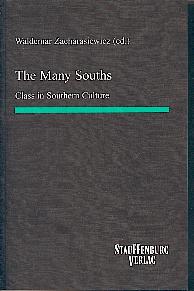The present volume is based on lectures given at an international symposium
held at the University of Vienna. Cultural and social historians and literary
scholars from nine countries deal with a neglected topic, the representation of
class in Southern culture, focusing in particular on the marginalized group
of ‘poor whites’.
The analysis of early sociological descriptions of
Southern society is followed by analyses of literary texts from the nineteenth
and twentieth centuries. The texts analyzed mirror the preoccupation of
both reactionary and radical authors and journalists with the lower social
classes. The critical investigations document the conservative tendencies in a
society in which white men from the upper classes were privileged while tenant
farmers and African-Americans functioned as the indispensable work force.
Several essays also explore the overlapping of social and ethnic conflicts,
which in the American South prevented solidarity across racial boundaries. They
also examine the experiences of poor whites as reflected in their music, and
study the hierarchies in Southern society. To conclude there are several essays
in which the new self-confidence of white and black women writers from the lower
social classes is illustrated. They exemplify the new voices which nowadays are
an integral part of Southern literature, which thus eludes homogenization and
demonstrates the presence of multiple voices in a varied literary
landscape.
-
Waldemar Zacharasiewicz: Preface
-
Waldemar Zacharasiewicz: Introduction: Class in Southern Culture
-
Michael O’Brien: Class and the Old South
-
Kurt Albert Mayer: Augustan Nostalgia and Patrician Disdain in A.B.
Longstreet’s Georgia Scenes
-
Giovanni Fabbi: “Democratic, fair, stalwart and progressive”: South
Carolina newspaper The State and the urban
middle-class in the World War I years
-
Robert J. Haws: Sex, Class and Masculinity in Southern
Culture
-
Pia Masiero Marcolin: “White Trash”: the Exemplary Naming of a Class in W.
Faulkner’s Wash
-
Richard Gray: “These are the unknown people”: Erskine Caldwell and the
Algebra of Need
-
Dan Carter: Race, Class and Southern Violence in the
1950s
-
Wayne Flynt: Class and Race, Text and Context in To Kill a
Mockingbird
-
Ineke Bockting: Class Distinctions and Their Transgression:
Code-Switching, Code-Mixing and Style-Shifting in Domestic Fiction of the
American South
-
Jan Nordby Gretlund: Flannery O’Connor and Class: The System Asserts
Itself
-
Charles Reagan Wilson: Saturated Southerners: The South’s Poor Whites in Modern
Southern Literature
-
Martin Crawford: A Class Novel? Cold Mountain
Fictions and Appalachian Realities
-
Marcel Arbeit: “Send the Bloody Intellectuals to Gym”: Harry Crews’s
Educated Super(wo)man and Victims of Both Sexes
-
Constante González Groba: The Dangerous Intersections of Artistic Pretensions and
Class Consciousness in Stories by Lee Smith
-
Anneke Leenhouts: A Different Pedestal: The Southern Lady’s Poorer Sisters
Come Into Their Own
-
Youli Theodosiadou: In a Class by Themselves: “Othermothers” in
Shay Youngblood’s The Big Mama Stories


